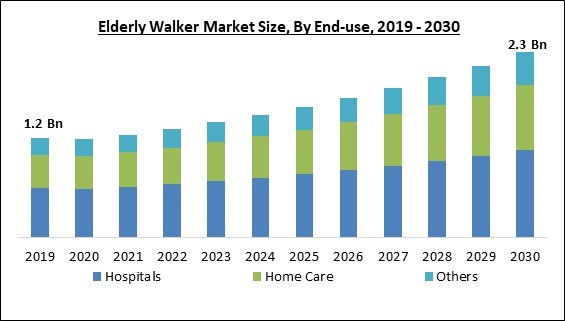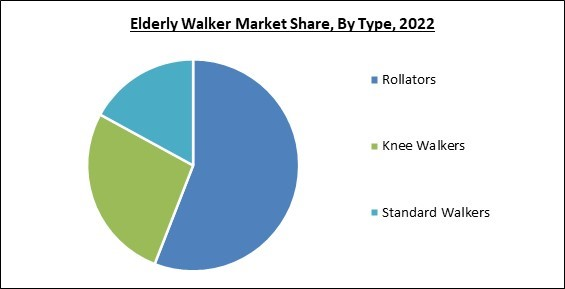Knee walkers are purchased more often as it is required for old people more. Hence, Knee Walkers generated $358.1 million revenue in the market in 2022. The WHO projects that by 2030, 1 in 6 individuals worldwide would be 60 or older. From 1 billion in 2020, there will be 1.4 billion persons over the age of 60 by this time. By 2050, there will be 2.1 billion people in the globe who are 60 or older, a doubling of the current population. Between 2020 and 2050, the number of people 80 or older is projected to treble, reaching 426 million. Eighty percent of senior citizens will reside in low- and middle-income nations by 2050.
Elderly adults often suffer from conditions including hearing loss, refractive errors, cataracts, back and neck discomfort, osteoarthritis, depression, chronic obstructive pulmonary disease, diabetes, and dementia. People are more prone to have many ailments at once as they become older. It is anticipated that the growing older population and such attempts to address the issue would increase healthcare spending and investment, supporting the availability of items like elderly walkers. Therefore, the growing elderly population may be fueling market expansion. Some of the factors impacting the market are increasing rates of falls and fractures among the elderly, global increase in arthritis cases, and the stigma associated with using walkers.
Fractures are often the most frequent major injury brought on by falls in older people. In this age range, falls, osteoporosis, and other variables that make people more prone to injury combine to cause fractures of the hip, wrist, humerus, and pelvis. The market is expected to expand as a consequence of the increase in falls and fractures among the older population. The market is anticipated to be impacted by an increase in the incidence of arthritis and gait abnormalities, as well as an increase in the demand for assistive technologies among persons who are visually impaired and an increase in the use of improved mobility devices.
However, one of the reasons some older people opt not to utilize assistive technology like walkers is the stigma of having a 'deval ued identity'as a consequence of utilizing it. An older person who is thinking about using assistive technology, such walkers, must deal with the potential for stigma from those who could see the walker as a sign of their late age and impairment. Thus, the stigma associated with using walkers might constitute a barrier to the market's expansion for older walkers. During the COVID-19 pandemic, hospitals focused their attention on treating COVID-19 patients and shunned other patients. Because of this, fewer individuals are receiving treatment for other illnesses including Parkinson's disease and arthritis. As a consequence, fewer elderly walkers are being sold. These factors adversely affected market expansion during the pandemic era.
Type Outlook
Based on type, the market is segmented into rollators, knee walkers, and standard walkers. In 2022, the rollators segment registered the largest revenue share in the market. Its use during the anticipated term is made easier by the rollators wheel's capacity to reduce the need for raising the apparatus and provide directional control. The incidence of osteoporosis and arthritis is also rising, as is awareness of assistive mobility aids and the growing use of technologically improved rollators, all of which contribute to the market's expansion.End-Use Outlook
On the basis of end-use, the market is divided into hospitals, home care, and others. In 2022, the homecare segment garnered a substantial revenue share in the market. This is because older patients receiving home care are using walkers more often. It offers a less expensive method for people to get remote healthcare services. Additionally, a growing emphasis on in-home care settings for older patients and an increase in knowledge of ways to improve the comfort of the elderly in particular, both contribute to the market's development.Regional Outlook
Region wise, the market is analysed across North America, Europe, Asia Pacific, and LAMEA. The North America region led the market by generating the highest revenue share in 2022. This is because there are many elderly people living in this area. The market in this area is primarily driven by the availability of cutting-edge healthcare facilities and well-developed reimbursement systems. Additionally, it is projected that the high incidence of target illnesses in this area, such as Parkinson's disease, arthritis, and other chronic impairments, would accelerate market expansion there throughout the course of the projection period.The market research report covers the analysis of key stake holders of the market. Key companies profiled in the report include Invacare Corporation, Drive DeVilbiss Healthcare (Medical Depot, Inc.), Compass Health Brands Corporation (Carex Health Brands), Medline Industries, Inc., Briggs Healthcare Corporation, Topro Industrie AS, GF Health Products, Inc., Nova Medical Products, Kaye Products, Inc. and Just Walkers.
Scope of the Study
By End-use
- Hospitals
- Home Care
- Others
By Type
- Rollators
- Knee Walkers
- Standard Walkers
By Geography
- North America
- US
- Canada
- Mexico
- Rest of North America
- Europe
- Germany
- UK
- France
- Russia
- Spain
- Italy
- Rest of Europe
- Asia Pacific
- China
- Japan
- India
- South Korea
- Singapore
- Malaysia
- Rest of Asia Pacific
- LAMEA
- Brazil
- Argentina
- UAE
- Saudi Arabia
- South Africa
- Nigeria
- Rest of LAMEA
Key Market Players
List of Companies Profiled in the Report:
- Invacare Corporation
- Drive DeVilbiss Healthcare (Medical Depot, Inc.)
- Compass Health Brands Corporation (Carex Health Brands)
- Medline Industries, Inc.
- Briggs Healthcare Corporation
- Topro Industrie AS
- GF Health Products, Inc.
- Nova Medical Products
- Kaye Products, Inc.
- Just Walkers
Unique Offerings
- Exhaustive coverage
- The highest number of Market tables and figures
- Subscription-based model available
- Guaranteed best price
- Assured post sales research support with 10% customization free
Table of Contents
Companies Mentioned
- Invacare Corporation
- Drive DeVilbiss Healthcare (Medical Depot, Inc.)
- Compass Health Brands Corporation (Carex Health Brands)
- Medline Industries, Inc.
- Briggs Healthcare Corporation
- Topro Industrie AS
- GF Health Products, Inc.
- Nova Medical Products
- Kaye Products, Inc.
- Just Walkers










